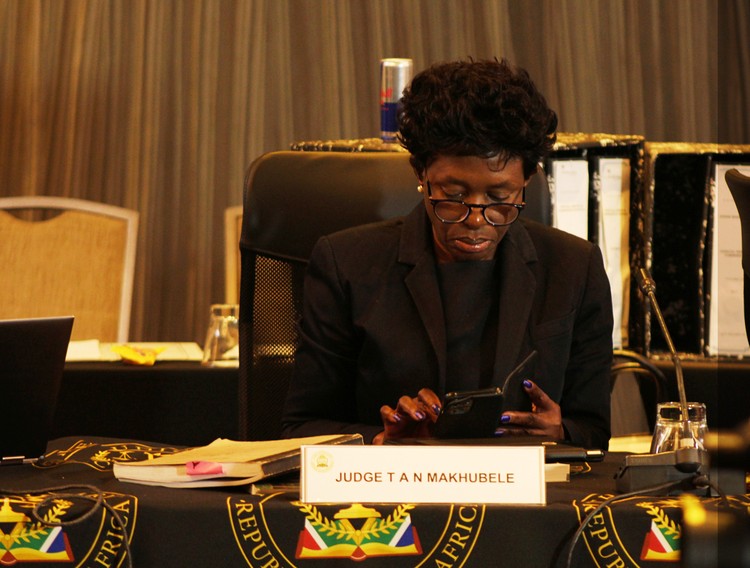Judge Nana Makhubele has been testifying before the Judicial Conduct Tribunal. The hearing is expected to continue on Thursday and Friday. Archive photo: Masego Mafata
Suspended Judge Nana Makhubele, who is appearing before a Judicial Conduct Tribunal on charges of gross misconduct on Thursday, accused evidence leader Dorian Paver of “ridiculing her”.
This after Paver questioned her about her knowledge of section 174 of the Constitution which governs the appointment of judges.
“You are familiar with the section?” Paver asked.
“Remind me,” she responded.
Paver pointed out that she was a judge. “Surely you know about it. I don’t want to accuse you of being evasive. But you are steadily showing signs of it,” he said.
Makbubele shot back: “But you are ridiculing me, Mr Paver. How do you tell me you are surprised I don’t know that section. I am a judge of the High Court. Is that not a ridicule?”
Makhubele is facing possible impeachment following a complaint by activist group #UniteBehind. She is accused of sitting as a judge at the same time that she was chair of the Passenger Rail Agency of South Africa (PRASA) interim board. She is also accused of being involved in state capture in connection with matters involving the Siyaya group of companies, in that she authorised, an alleged “secret settlement deal”, payments from PRASA to Siyaya for about R50-million.
After Makhubele left the state-owned enterprise, PRASA brought court proceedings to set aside the deal.
Makhubele has denied all the allegations against her.
She claims she had an agreement with Gauteng Judge President Dunstan Mlambo, even before she went for the JSC interview, that she would not take up judicial office on 1 January 2018 but rather on 1 April that year because of her commitments to the Water Tribunal and other matters she was dealing with as an advocate.
But Mlambo, in his evidence, denied this.
Thursday’s cross examination was punctuated by long silences from Makhubele, particularly when asked to characterise her relationship with Mlambo.
She refused to say he was her mentor, but admitted that they got on well.
She also struggled to explain why, in some instances, her version had not been put to witnesses, including Mlambo.
This particularly referenced a meeting she claims she had in December 2017 with Mlambo in which, she claimed, she reminded him of the prior agreement that she could only take up judicial office in April 2018. She says she informed him about the PRASA chairmanship and he had told her that he would arrange to revoke her appointment.
He had not given her an appointment letter and they had discussed changes to the provisional judges roster for the next session, she claims.
Mlambo denies this. He said she initially tried to conceal her position on the board, and that he was the one who eventually “extracted” it from her at a meeting in January 2018, attended by deputy judge president Aubrey Ledwaba after she failed to report for work.
Ledwaba, in his affidavit, said he tried to convince Makhubele to resign from PRASA but she refused, saying she did not want to let the Minister of Transport down.
At the time that Mlambo gave evidence, Makhubele was being represented by advocate Vincent Maleka.
Makhubele, in attempting to explain why her version had not been put to Mlambo, said: “My simple answer is I wish Maleka was here. I told him [my version]. I am not fabricating it. We all know the implications. But it was his prerogative as my advisor to decide which questions to put and which not to.”
Paver asked if she could give any plausible explanation as to why two senior judges would perjure themselves.
Makhubele responded: “As to whether they are not telling the truth or I am not telling the truth, that is something the Tribunal will have to make a finding on.”
She said Mlambo had asked her for a report, compiled by law firm ENS at the instance of the PRASA Board which dealt with her appointment.
She said at that time she was “in the newspapers and accused of doing these wrongs”.
There was also a court application in which the appointment of the interim board and her position was being challenged.
Makhubele said the board had unanimously rejected the findings of the report - that she was, in fact a judge, because the law firm had “overstepped its mandate” and “gone off on a tangent”.
The board had resolved to get a second opinion.
But she resigned from the board in mid-March 2018.
Paver said: “So ENS was of the view that you were a judge?”
Makhubele responded: “That’s their opinion. I have mine. Everybody has theirs. The law will save us.”
Questioned how she became the chairperson of the board - as opposed to a non-executive director - Makhubele said she did not know and the decision had been made by the Cabinet.
She first learned of it from an announcement on television.
Paver said: “So this must have come out of the sky like a bolt out of the blue. You were getting ready to become a judge and then you get an appointment to be the chairperson of a board when you had no experience, handling billions and billions of taxpayers money.”
Makhubele responded: “You must ask whoever made that appointment. Unless you want to minimise my general experience. I don’t’ think that is your intention. I will just let it slide.”
Late on Thursday, Paver began questioning Makhubele about the powers of the board and if, in fact, it had authority to settle legal claims.
He is expected to continue with questioning her on Friday morning.
